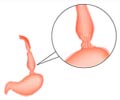In Barrett esophagus patients, treatment of abnormal cells with radiofrequency ablation (use of heat applied through an endoscope to destroy cells) resulted in a reduced risk of this condition progressing to cancer.

In the last 3 decades, the incidence of esophageal cancer has increased more rapidly that other cancers in the Western world. This type of cancer often originates from Barrett esophagus, a condition that involves abnormal changes in the cells of the lower portion of the esophagus, a complication of severe chronic gastrointestinal reflux disease (GERD), according to background information in the article. Radiofrequency ablation (RFA) is an effective treatment for Barrett esophagus, but its benefits have largely been shown in patients with high-grade dysplasia (precancerous changes more likely to progress quickly to cancer). The question of whether RFA is effective for patients with Barrett esophagus and low-grade dysplasia (precancerous changes that progress more slowly to cancer) "is a clinically important question because 25 percent to 40 percent of patients with Barrett esophagus are diagnosed with low-grade dysplasia at some point during follow-up," the authors write.
K. Nadine Phoa, M.D., of the University of Amsterdam, the Netherlands, and colleagues randomly assigned 136 patients with a confirmed diagnosis of Barrett esophagus and low-grade dysplasia to radiofrequency ablation (ablation; maximum of 5 sessions allowed) or endoscopic surveillance (control). The researchers assessed the rate of progression to high-grade dysplasia and esophageal cancer. The study was conducted at 9 European sites between June 2007 and June 2011; follow-up ended May 2013.
The researchers found that ablation was associated with reduced absolute risk of progression to high-grade dysplasia or cancer of 25 percent (1.5 percent vs 26.5 percent for control) and a reduced absolute risk of progression to cancer of 7.4 percent (1.5 percent vs 8.8 percent). Complete eradication of dysplasia occurred and persisted in the majority of patients in the ablation group.
The trial was terminated early due to the superiority of ablation for the primary outcome and concerns about patient safety should the trial continue.
"In this multicenter, randomized trial of radiofrequency ablation vs surveillance in patients with Barrett esophagus and a confirmed histological diagnosis of low-grade dysplasia, ablation substantially reduced [tumor] progression to high-grade dysplasia and adenocarcinoma over 3 years of follow-up. Patients with a confirmed diagnosis of low-grade dysplasia should therefore be considered for ablation therapy," the authors conclude.
Advertisement
Editor's Note: Please see the article for additional information, including other authors, author contributions and affiliations, financial disclosures, funding and support, etc.
Advertisement
Klaus Monkemuller, M.D., Ph.D., F.A.S.G.E., of the University of Alabama at Birmingham, comments on the findings of this study in an accompanying editorial.
"The clinical trial by Phoa et al provides important evidence to support the use of radiofrequency ablation not only for patients with high-grade dysplasia and early cancer, but also for carefully selected patients [via screening and testing] with Barrett esophagus and confirmed low-grade dysplasia. A proactive endoscopic approach to eliminate dysplasia may result in reduced morbidity and mortality related to the progression of this disease."
Source-Eurekalert















